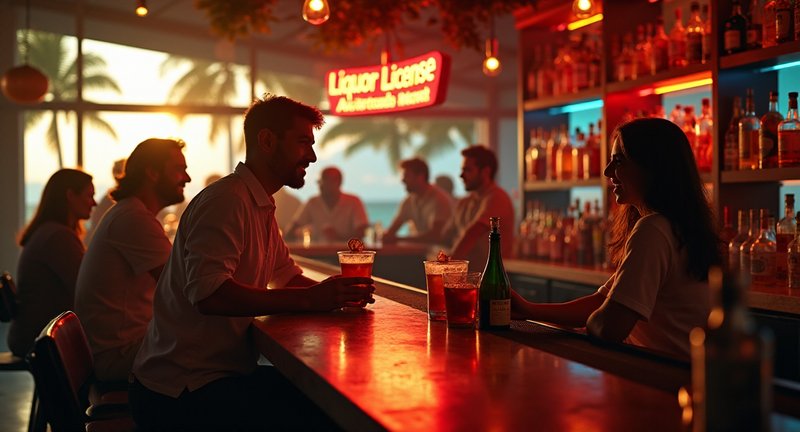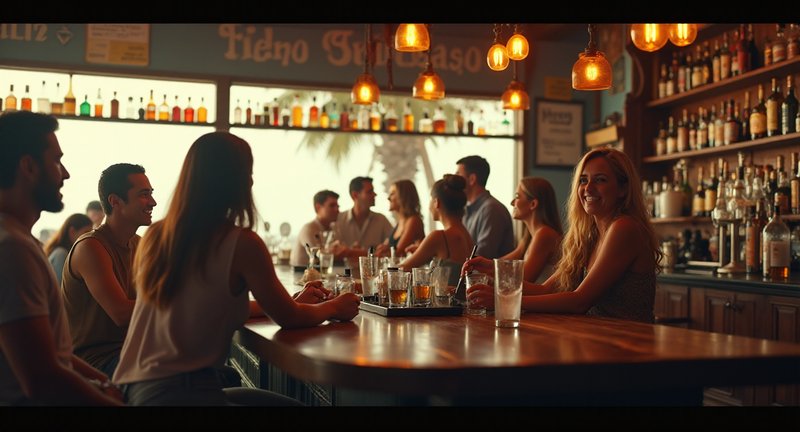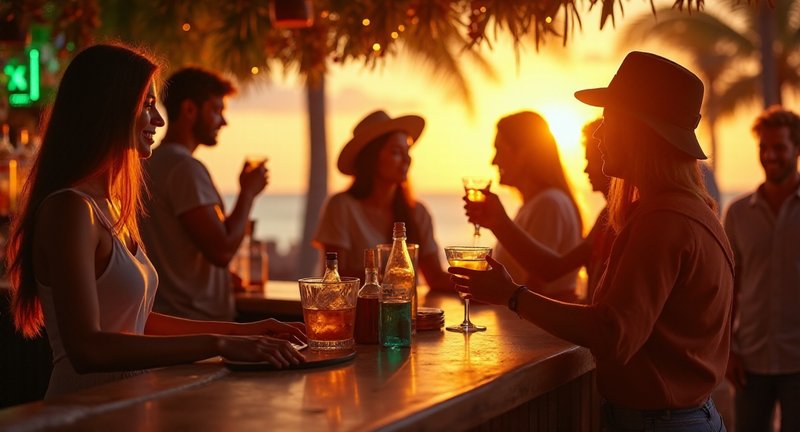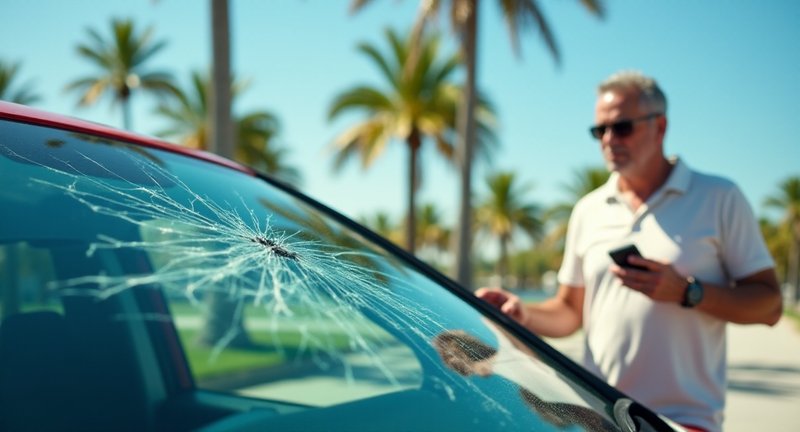Overview of Liquor License Florida Price
The cost of obtaining a liquor license in Florida can be a maze of regulations, categories, and price ranges. It’s something that I’ve seen countless businesses tackle, and it’s not as straightforward as people think. The Liquor License Florida Price depends on several factors, and to be honest, it’s an investment that needs thoughtful planning.

First, let me break it down for you:
-
License Type: Florida offers different types of liquor licenses depending on the nature of your establishment whether it’s a restaurant, bar, or package store. Each category has its own specific requirements and associated costs.
-
County Location: The cost can vary significantly based on where you’re setting up shop. A license in Miami-Dade or Broward could set you back a hefty amount compared to a smaller county like Alachua or Suwannee. Trust me, location is key, and the Florida alcohol license cost reflects that reality.
-
Application Fees: These are non-refundable, ranging from $100 to $500 depending on the license type. It’s a small fee compared to the actual license price but a necessary step in the process.
-
Supply and Demand: Florida’s quota system means that in high-demand areas, you might have to purchase a license from someone who already owns one, pushing prices upwards of $100,000 or more.
Here’s a nugget of advice: getting a liquor license is not something you rush into. Plan for this expense early in your business strategy. Many people don’t realize that even once you’ve paid, it can take time sometimes months before you actually get approved.
Understanding Liquor License Florida Price
Navigating the process of getting a liquor license in Florida can feel like you’re stepping into uncharted waters. I’ve seen it myself – the costs can vary wildly depending on the county, the type of license, and other local regulations. It’s a bit like trying to hit a moving target.
Let’s not forget, there’s a difference between licenses for bars, restaurants, and retail stores. Each comes with its own price tag, which can sometimes catch people off guard. One thing I always advise is to do a little homework upfront – you’ll save yourself some headaches down the road.
Now, something a lot of people don’t realize is the role of quotas in certain areas. In some Florida counties, licenses are limited, making them more expensive. It’s almost like bidding for a coveted spot. But there are alternatives, such as temporary licenses or leasing a license, which can help reduce costs.

In my experience, another thing worth mentioning is how renewal fees and the potential for fines can affect your long-term budget. Keeping everything in order, from taxes to regulations, ensures you’re not hit with surprises later. It pays to plan, trust me on that.
Overall, acquiring one of these licenses is a significant financial commitment. So, take your time, do the research, and maybe even consult with someone who’s been through it before. It’s always better to know what you’re getting into.
Understanding the Cost of Obtaining a Liquor License in Florida
Navigating the financial labyrinth of obtaining a liquor license in Florida can be as intricate as solving a Rubik’s Cube blindfolded. Let me share some insights from my own journey through this process.
First off, let’s break down what you need to consider:
-
Initial Application Fees: These fees vary depending on the type of license and your location. Whether you’re eyeing a package store or a bar, expect to part with a significant sum right out of the gate.
-
Annual Renewal Costs: Once you’ve secured your license, remember that the costs don’t stop there. Renewals are a recurring expense, and these costs can fluctuate based on changes in state regulations and your business’s specific needs.
-
Local Government Fees: Beyond state-level expenses, you might encounter additional charges from your local municipality. These could be for zoning permits or local compliance inspections, and they can add a hefty amount to your overall expenditure.
-
Operational Costs: Don’t overlook the cost of compliance. You may need to invest in training for your staff or install specific security measures to meet regulatory requirements. These operational costs can add up, impacting your budget.
-
Consultation Fees: In some cases, hiring a consultant to navigate the paperwork and legalese can be beneficial. While this is an extra expense, it might save you time and help avoid costly mistakes.
Remember, these figures can vary widely, so it’s crucial to do thorough research and budget accordingly. The journey to getting a license may be costly, but it’s a vital investment in your business’s future success.
Types of Liquor Licenses in Florida and Their Fees
When I first ventured into the business world, I quickly learned that acquiring a liquor license in Florida is more than just filling out paperwork. It turns out, there are different types of licenses, each suited for specific needs. It’s like choosing a tailor-made suit you need the right fit.
For instance, the 4COP license is what you’d want if you’re serving spirits on-site, like in a restaurant or bar. But here’s the catch: the fee for this license can vary depending on your county. Some counties can surprise you with how much they charge, while others are more forgiving on the wallet.
Then, there’s the 2COP license, which covers beer and wine. If you’re planning to open a cozy cafe or a low-key lounge, this might be your best option. And again, don’t think there’s a fixed price tag fees can swing based on location.
There’s even a special license if you’re planning to sell alcohol at events or festivals. They’re short-term and much less expensive. Think of it like renting a tux for the evening instead of buying a whole new suit.
Understanding these different licenses and their fees can feel like navigating a maze, but once you figure out which one aligns with your business, the process becomes much smoother. Trust me, knowing what you’re getting into will save you time and some frustration.
Factors Influencing the Price of a Liquor License in Florida
When I first dived into the world of liquor licensing in Florida, I was amazed by the myriad factors that can influence the cost. Understanding these elements can save you both time and money. Here’s a breakdown of what to consider:
-
Type of License: Different licenses cater to various types of alcohol sales retail, wholesale, or on-premises consumption. Each category carries its own price tag.
-
Location, Location, Location: The city or county in which you plan to operate plays a significant role. Urban areas typically have higher demand and, consequently, higher prices.
-
Demand and Competition: If you’re entering a saturated market, expect to pay more. A booming nightlife scene can drive prices up as more entrepreneurs vie for a slice of the pie.
-
Historical Significance: In some cases, the age of an existing license can add value. An established license might come at a premium due to its historical significance or grandfathered rights.
-
Compliance and Fees: Don’t forget about the hidden costs application fees, background checks, and other compliance-related expenses can pile up.
In my experience, having a clear understanding of these factors has made all the difference in making informed decisions. Research thoroughly and consider consulting with industry experts to navigate this complex landscape effectively. The road to acquiring a liquor license can be winding, but with the right insights, it can lead to fruitful ventures.
How to Apply for a Florida Alcohol License
When I first explored the process of getting an alcohol license in Florida, it felt like a maze. But, once you know the steps, it’s really about patience and preparation. The first thing you’ll need to do is decide which license fits your business. Florida offers several types, depending on whether you’re selling beer, wine, or spirits. This decision sets the tone for everything else.
Next, gather your paperwork. Believe me, it’s better to over-prepare. Things like your business details, property zoning approvals, and background checks will all come into play. Missing a single form can lead to frustrating delays. It might seem like a lot, but getting it right upfront saves so much time in the long run.
Now, let’s talk about submitting your application. You’ll be dealing with the Florida Department of Business and Professional Regulation. It’s worth knowing their site inside and out, as it holds all the details and updates you might need. This is where you also pay the fee, but more on that in a moment.
The approval process can take time, so be prepared to wait. However, staying in touch with the DBPR can sometimes speed things up. Just a gentle nudge to check on your application status never hurts. I’ve found that persistence often pays off.
And before you ask, yes, there’s a fee involved. The amount varies based on the type of license and your location within the state. Make sure you have this budgeted beforehand to avoid surprises later.
Costs Associated with Different Types of Alcohol Licenses in Florida
Regarding getting an alcohol license in Florida, the price tag varies depending on the type of permit you’re chasing. Think of it like shopping for a car – a compact might get you around just fine, but a luxury model demands a heftier check.
The basic beer and wine licenses are your economy class. They’re more affordable, making them a great entry point for smaller venues or casual restaurants. On the other hand, a full liquor license? That’s more like stepping into first class. You’ll need to dig deeper into your pocket for that one.
Then there’s the location. I’ve seen prices swing wildly just because a place is closer to the beach or in a prime urban spot. It’s like real estate – location, location, location! And if you’re looking at a special club or catering license, buckle up. These can come with unique fees depending on the business structure.
The process also adds to the cost. There’s no shortage of paperwork, and hiring a professional to handle that for you? It’s not cheap, but it’s peace of mind in a sometimes chaotic landscape. Let’s just say I’ve learned the hard way that cutting corners here often leads to more headaches than savings.
In the end, understanding what you’re paying for is key. Don’t just look at the sticker price. Ask yourself: is this license the right fit for my business? Believe me, investing in the right license can be the difference between smooth sailing and running aground.
Florida Alcohol License Application Fees Breakdown
When I first ventured into the maze of Florida’s alcohol licensing, one thing became crystal clear: it’s not just about filing a form. The fees are a puzzle of their own, varying based on the type of license you’re after and where your business is located.
For instance, a license to sell beer and wine might seem more straightforward, but it’s still bound by specific regional regulations. If you’re looking into something more ambitious, like offering full liquor, be prepared for a bigger financial commitment.
The state also divides itself into different counties, and each one has its own quirks when it comes to licensing fees. Trust me, getting these numbers wrong can throw a wrench into your planning. You’ve got to keep an eye on both state and local requirements.
The type of business you’re operating plays a key role, too. A restaurant looking to serve alcohol? You’ll be facing a different fee structure than, say, a nightclub or package store. Each niche has its own financial threshold to cross.
On top of that, certain areas in Florida might see higher fees due to demand. You’ll find that high-traffic tourist zones don’t come cheap. But, that’s the cost of doing business in a hotspot.
It’s easy to get lost in these numbers, but once you’ve got a handle on the system, it’s just one more step toward launching your dream. And honestly, after going through it myself, I’ve learned that the investment is worth the payoff.
The Essentials You Need to Know About Liquor License Florida Price
Concerning navigating the world of alcohol sales in the Sunshine State, understanding the Liquor License Florida Price is paramount. Having ventured into this domain, I can assure you that the costs can be as varied as Florida’s vibrant nightlife. Here’s what you need to consider:
-
Types of Licenses: Florida offers several types of liquor licenses, each with its unique pricing structure. For example:
- Quota Licenses: These are limited and can be pricier due to their scarcity.
- Special Licenses: Often used for events or festivals, these can be more affordable but come with restrictions.
-
Factors Affecting Price:
- Location: Urban areas typically see higher prices than rural regions.
- Business Type: A full-service restaurant might face different fees compared to a small bar or retail shop.
-
Initial and Renewal Fees:
- Don’t forget the initial fee and the ongoing renewal costs. Some licenses can run into thousands for the initial purchase, while renewals might be more manageable.
-
Local Government Fees: Besides state requirements, local counties may impose additional fees, so always check your local regulations.
-
Hidden Costs: Beyond the obvious, consider legal fees, application processing, and even the time spent navigating the application process.
In my experience, budgeting for the Cost of florida liquor license isn’t just about the sticker shock; it’s about understanding the total financial landscape. Engage with experts, ask questions, and prepare for a bit of a journey. Trust me, it’s worth the effort to ensure your business operates legally and successfully.

The Importance of License Location in Florida Pricing
Considering securing a liquor license in Florida, location is not just an afterthought it’s the crux of your entire strategy. You’d think all you need is the right paperwork and some patience. But oh no, it’s a lot more nuanced than that.
Florida’s patchwork of counties and cities has created a fascinating pricing puzzle. What you pay can shift dramatically, depending on where your establishment sets down roots. Coastal hotspots? You might as well be bidding for beachfront property. But head inland, and you could snag a deal that seems almost too good to be true.
In the denser, tourist-heavy areas, competition is fierce. You’re not just paying for the right to serve; you’re buying access to a thriving, thirsty clientele. I’ve seen deals fall apart because the cost of the license was nearly as steep as the rent itself. It’s the kind of thing that can make or break a business before you’ve even opened your doors.
And it’s not just the price that varies; availability plays its own game. In some parts of the state, licenses are as rare as a sunny day without humidity. In others, they’re practically falling from the sky. If you’re not prepared to navigate this local dance, you could find yourself either empty-handed or overpaying by a mile.
In short, it’s crucial to understand the lay of the land. Your zip code will determine whether you’re making a strategic investment or setting yourself up for an uphill battle.
Liquor License Transfer Fees and Procedures in Florida
Transferring a liquor license in Florida isn’t as simple as handing over a piece of paper. It’s more like embarking on a carefully orchestrated dance with bureaucracy. When I first went through this process, I realized that it’s not just about paying fees; it’s about following precise steps to ensure a smooth transition.
The fee itself can vary depending on the county and type of license, but it’s typically a non-negotiable expense. It feels like you’re jumping through hoops at times, but believe me, it’s all part of the game. If you’re looking to transfer, prepare yourself to get into the nitty-gritty of paperwork.
The procedures start with submitting a formal application to the Division of Alcoholic Beverages and Tobacco (ABT). From my experience, every detail matters. Miss something minor? You’ll find yourself back at the starting line. Be prepared to provide all the necessary documentation, from the original license to background checks.
Once you’ve filed everything, the ABT will review it and fingers crossed approve it. Then comes the waiting period, which can feel like an eternity if you’re eager to start pouring drinks. If your application is flawless, the process will move faster, but I’ve seen a simple oversight add weeks to the timeline.
One thing to remember: it’s worth consulting a professional who’s done this before. It can save you from those frustrating delays. They might even help you navigate the finer points that only show up after you’re knee-deep in forms.
Annual Renewal Fees for Alcohol Licenses in Florida
When diving into the world of alcohol licenses in the Sunshine State, one cannot overlook the annual renewal fees. In my experience, these fees can feel like a hidden treasure map, leading you through a maze of paperwork and regulations. It’s essential to be prepared for this recurring cost, as it’s not just a simple formality.
The annual renewal isn’t merely a bureaucratic hurdle; it represents a commitment to operating within the legal framework of Florida’s vibrant hospitality industry. Each year, I remind myself to budget accordingly, as the cost can vary depending on the type of license you hold. For instance, the renewal fees for a retail license may differ significantly from those for a restaurant license.
I often liken the process to tending a garden requiring regular care and attention to flourish. Being mindful of these fees ensures you can maintain your ability to serve your customers.
Moreover, it’s crucial to stay on top of any changes that the state may introduce. Sometimes, these fees can fluctuate based on legislative changes or adjustments in local regulations. A proactive approach will save you from last-minute surprises and potential business interruptions.
So, as you embark on your journey with an alcohol license, keep the annual renewal fees in your sights. They are a small price to pay for the privilege of serving your community and enjoying the fruits of your labor.
Special Event Alcohol Permit Costs in Florida
In relation to hosting a special event in the Sunshine State, one crucial aspect that often gets overlooked is the cost associated with obtaining an alcohol permit. Trust me, I’ve been there thinking it’s just a formality until I saw the numbers. Let’s break it down together.
Understanding Special Event Alcohol Permits
In Florida, if you want to serve alcohol at your event, you’ll typically need a special event permit. The costs can vary widely based on several factors, including:
- Type of Event: Is it a wedding, festival, or corporate gathering? Each event type can have different fees.
- Duration: The length of your event can affect the permit fees. A weekend celebration might cost more than a single-day affair.
- Location: Different counties and municipalities may impose their own regulations and associated costs.
Average Costs to Consider
From my experience, here’s a rough estimate of what you might expect:
- Basic Fees: Starting at around $100 for short events.
- Additional Charges: Expect to see costs for background checks or additional permits, which can add another $50-$150.
- Insurance Requirements: Some venues might require liability insurance, which can run anywhere from $100 to $1,000 depending on the coverage.
Final Thoughts
While these fees may seem daunting, the right preparation can make the process smoother. Always check with your local regulatory authority for the most accurate and detailed information. Remember, a little research now can save you from surprises later. After all, you want your event to be remembered for the right reasons!
How License Quotas Affect Alcohol License Prices in Florida
License quotas are one of the most interesting mechanisms that can drastically affect the cost of alcohol licenses in Florida. From my own experience, I’ve seen these quotas create a ripple effect in the market, making these licenses something of a rare commodity.
Let me break it down: Florida operates on a quota system where the number of licenses available in any given county is directly tied to its population. That means, as the population grows, a few more licenses might be released. However, if you’re in an area with a high demand and a limited number of licenses, competition is fierce.
What happens when there’s scarcity? Prices soar. Here’s how it plays out:
-
Supply & Demand Dynamic: With only a handful of licenses available and countless businesses wanting to serve alcohol, the price for acquiring one skyrockets. It’s not uncommon to see businesses bidding aggressively.
-
Secondary Market: Because new licenses are released sparingly, a secondary market forms. Here, existing licenses are sold privately, often at much higher prices than their original issuance value. Think of it like a rare trading card except this one allows you to sell alcohol.
-
Population Growth Equals Cost Growth: As more people flock to certain counties, the demand for alcohol-serving establishments increases, but the slow release of new licenses means prices rise in tandem with population growth.
From my perspective, these quotas turn the licensing process into something akin to playing a high-stakes game of Monopoly. You’re not just purchasing a license, you’re investing in a coveted asset that holds a lot of power, both operationally and financially.
Financing Options for Purchasing a Liquor License in Florida
Navigating the path to owning a liquor license in Florida can feel like a bit of a treasure hunt. Over the years, I’ve come across various financing routes, some more conventional, others creative, yet all geared toward making that license attainable.
For many, traditional bank loans seem like the go-to option. Banks are familiar with the licensing landscape, but they often want to see a robust financial history. If your finances tell a solid story, you might get the green light.
Yet, don’t overlook private lenders. They tend to be more flexible, especially when it comes to timelines and repayment terms. I’ve seen folks benefit from this route when quick access to capital was key.
Then, there’s seller financing, which I personally find intriguing. Sometimes the seller of the license is willing to offer financing terms themselves, letting you stretch payments out over time. This can be a smoother entry point if upfront cash is tight.
Tapping into business equity is another option. If you’ve built up value in your existing business, consider leveraging that. I’ve seen business owners make this work like a charm, essentially borrowing against their own success.
Crowdfunding, while unconventional, is another fascinating route. If you’re open to community backing, platforms can help rally support, especially if you have a compelling business vision. It’s not always the first option people consider, but I’ve watched it work wonders.
Quick Info
How much does a liquor license cost in Florida?
The cost of a liquor license in Florida varies based on the type of license and the location of your business. Prices can range from $100 for a 1COP beer and wine license to upwards of $400,000 for a full liquor license like a 4COP. The exact cost depends on factors such as county population and license demand. Additionally, there are annual renewal fees to consider, so it’s important to check with local authorities for specific pricing details.
How hard is it to get a liquor license in Florida?
Obtaining a liquor license in Florida can be a lengthy and competitive process, particularly for full liquor licenses (4COP) due to limited availability. Applicants must meet strict requirements, such as passing background checks, ensuring zoning compliance, and sometimes participating in a lottery system or purchasing an existing license from another business. Beer and wine licenses, however, are generally easier to obtain, requiring less stringent regulations. Persistence and adherence to the state’s guidelines are key.
How many types of liquor licenses are there in Florida?
Florida offers several types of liquor licenses, with some of the most common being 1COP (beer only), 2COP (beer and wine), and 4COP (beer, wine, and spirits). Each license has specific limitations regarding what types of alcohol can be sold and whether the establishment must be a restaurant, bar, or package store. Additional specialized licenses also exist, such as those for catering, distilling, or retail. Each type is tailored to different business models and needs.
What is the value of a 4COP liquor license in Florida?
A 4COP liquor license in Florida, which allows the sale of beer, wine, and spirits for consumption on-site, can be extremely valuable. Depending on the county, the price can range anywhere from $130,000 to over $400,000 due to limited availability and high demand. These licenses are often transferred between businesses in a secondary market, and their value fluctuates based on location, population, and competition within the area.
Can you sell alcohol without a liquor license in Florida?
No, selling alcohol without a valid liquor license in Florida is illegal. Operating without a license can lead to severe penalties, including hefty fines, criminal charges, and the potential shutdown of your business. The state requires that any establishment selling or serving alcoholic beverages obtain the appropriate license based on the type of alcohol and the business’s nature. Attempting to bypass this regulation is considered a serious offense.
How long does a liquor license last in Florida?
In Florida, a liquor license typically lasts for one year. Licenses must be renewed annually, and the renewal process includes paying a renewal fee, which varies depending on the type of license and location. Failure to renew on time can result in penalties, late fees, or even revocation of the license. Some specific licenses, such as temporary event licenses, may have shorter durations depending on the terms of issuance.
Do I need a license to serve alcohol at an event in Florida?
Yes, you generally need a temporary liquor license to serve alcohol at events in Florida. The type of license required depends on the nature of the event, whether it’s public or private, and whether you plan to sell alcohol. Temporary permits, such as the Special Event Permit, are available for short-term needs, and they allow the event organizers to serve alcohol legally. Failing to obtain the proper permit can lead to legal consequences.
What is the first liquor license in Florida?
The first liquor license in Florida refers to the 1COP license, which allows the sale of beer for consumption on the premises and package sales. This license is typically issued to smaller businesses like beer bars, breweries, or restaurants that focus primarily on beer sales. It’s considered the most basic liquor license and is relatively easier to obtain compared to other licenses that include wine and spirits.
Do you need a liquor license to be a bartender in Florida?
No, bartenders in Florida do not need a liquor license to serve alcohol. However, they must work at an establishment that holds a valid liquor license. Bartenders are typically required to be at least 18 years old to serve alcohol, and many establishments prefer or require bartenders to complete alcohol awareness or responsible beverage service training to ensure compliance with state laws and responsible alcohol service.
How long does it take to get a 2COP license in Florida?
Obtaining a 2COP license in Florida, which allows the sale of beer and wine, can take anywhere from a few weeks to several months. The timeline depends on how quickly you complete the application process and meet the state’s requirements, such as zoning approval and background checks. If there are no significant issues or delays, the process is generally faster than for full liquor licenses, but it’s still advisable to plan ahead.











This really hits home! When I was navigating through the licensing process for my small bistro, the variety of options really threw me off at first. I agree, understanding which license suits your business model is like getting that perfect fit it saves you so much hassle later!
Wow, this really hits home. I’m in the middle of securing a liquor license for my own business, and it’s no joke. The renewal fees are something I didn’t fully consider at first, and I love that you highlighted how ongoing these costs can be. It’s not just a one-time payment – staying compliant is an ongoing process, with things like staff training and local fees adding up quickly. I also appreciate the mention of consultants because I’ve been debating whether to bring one in to help with the paperwork. It’s expensive but seems like a worthy investment to avoid those costly mistakes. Thanks for laying it out so well, this is a huge help!
You’re so right about doing research upfront! People often forget how different the costs are between licenses for bars and retail. The bit about quotas caught my eye too – it’s crazy how in-demand licenses can drive up prices. Definitely not a one-size-fits-all situation!
This is such a clear and helpful breakdown of liquor licensing in Florida! I totally agree that the type of license and the location play a huge role in the cost. It’s wild how the price can jump up based on just moving to a different county. It’s one of those things people might not think about when they’re dreaming of opening a bar or restaurant, but wow, planning is definitely key. I’ve seen businesses get stuck waiting months for approval, so the advice to start early can really save a lot of headaches. Thanks for sharing this info – it’s such a valuable resource for anyone thinking of getting into the business!